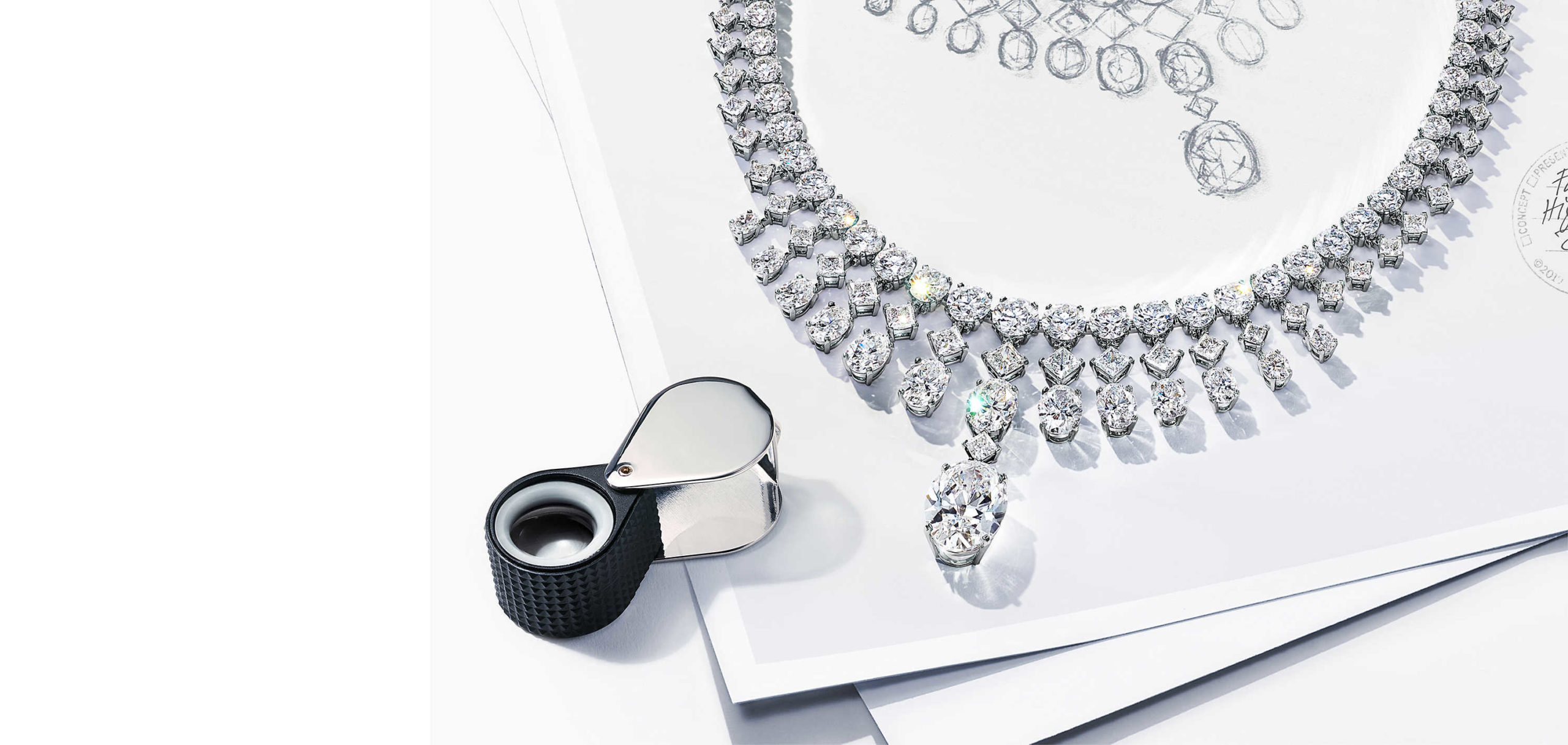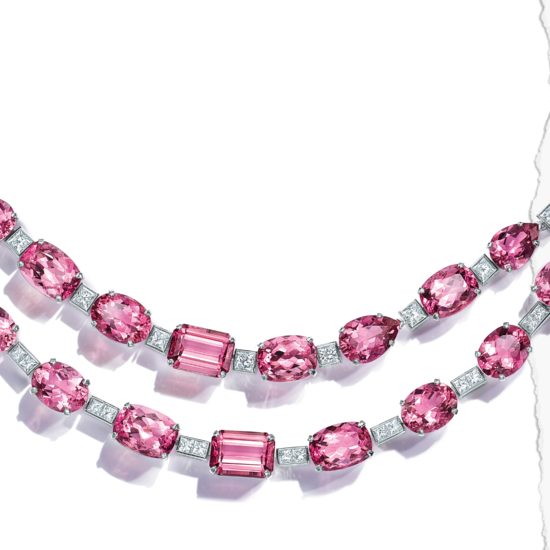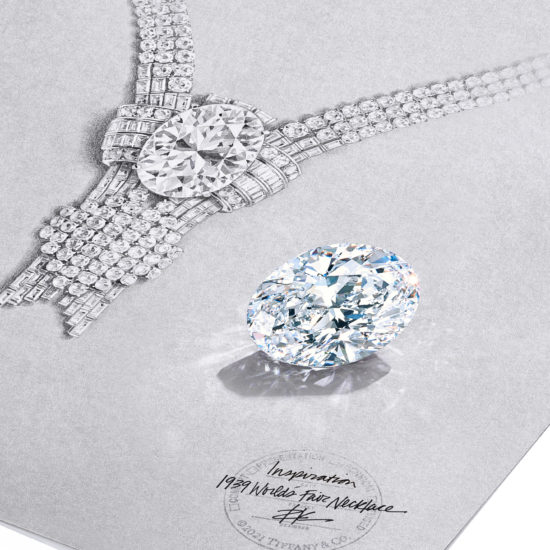
Tiffany marks an industry first by sharing the full craftsmanship journey of its individually registered diamonds
New York, NY (August 18th, 2020) – This October, Tiffany & Co. will take an unprecedented step in diamond traceability by sharing the full craftsmanship journey of its newly sourced, individually registered diamonds (0.18 carats or larger). Disclosing the country where each stone is crafted and set in jewelry marks an industry first. This follows the 2019 announcement that Tiffany would become the first global luxury jeweler to provide the provenance (region or countries of origin) of its individually registered diamonds. By taking transparency to a new level and sharing the full craftsmanship journey of its diamonds, Tiffany reinforces the brand’s commitment to ensuring that every step in the journey of its products contributes to the well-being of people and the planet
“Today we advance our commitment to diamond traceability one step further,” said Anisa Kamadoli Costa, chief sustainability officer, Tiffany & Co. “Our customers deserve to know that a Tiffany diamond was sourced with the highest standards, not only in quality but also in social and environmental responsibility. We believe that diamond traceability is the best means to ensure both.”
A diamond’s region or countries of origin, along with where it was cut and polished, graded and quality assured, as well as set in jewelry, will be shared with Tiffany customers for each newly sourced, individually registered diamond. This information will be available from any sales professional as well as printed on the Tiffany Diamond Certificate.
Tiffany continues to lead the industry by bringing a new level of transparency to its diamond supply chain. The brand is unique among global luxury jewelers in owning and operating five of its own diamond polishing workshops around the world. This is where nearly 1,500 Tiffany artisans ensure excellence of cut is obsessively considered to maximize brilliance, dispersion and scintillation – not just carat weight. With Company owned diamond workshops in Belgium, Mauritius, Botswana, Vietnam and Cambodia, as well as a Tiffany Gemological Laboratory in New York and five jewelry manufacturing workshops in the North America, Tiffany can ensure its own superlative standards are met.
“Sharing the craftsmanship journey of Tiffany diamonds reflects decades of investment in our supply chain,” said Andrew Hart, SVP Diamond and Jewelry Supply, Tiffany & Co. “Directly sourcing responsibly mined rough diamonds, and crafting and setting those diamonds to our standards in our own workshops, is unique to Tiffany among luxury jewelers.”
Offering this degree of supply chain transparency, which is without equal among global luxury jewelers, sets Tiffany apart and is made possible by the 20+ year investment in vertical integration. This vertical integration model helps uphold standards of craftsmanship, safe and healthy working environments, community economic development and supply chain traceability. Together with the philanthropic endeavors led by The Tiffany & Co. Foundation, which has granted $85M over 20 years, Tiffany & Co. has been a pioneer in sustainable luxury.
THE STEPS IN A TIFFANY DIAMOND’S CRAFTSMANSHIP JOURNEY

Responsible Sourcing
Many Tiffany diamonds begin their journey as responsibly sourced rough stones from trusted suppliers, mined in countries such as Australia, Botswana, Canada, Namibia, Russia and South Africa, and prohibited from areas of concern such as Zimbabwe and Angola. Since January 2019, Tiffany has been disclosing the provenance (region or countries of origin) of its individually registered diamonds to consumers, a first among global luxury jewelers.
Preparation & Planning
All of the diamonds Tiffany sources as rough stones continue their journey in Antwerp, Belgium. Here, each individual diamond’s origin is recorded, and then the diamond is sorted for size, color, clarity and florescence, before its unique design is mapped.
Cutting & Polishing
Tiffany cuts and polishes diamonds with great accuracy and artistry at workshops in Mauritius, Botswana and Vietnam, Cambodia as well as Belgium. Tiffany owned or approved diamond cutting and polishing facilities offer safe and healthy work environments; and adhere to health and safety standards that, in many places, go above and beyond local laws. In its workshops, Tiffany is proud to hire locally, invest in communities, and provide a living wage for employees in developing countries. Tiffany also procures select polished diamonds from trusted suppliers who comply with its traceability, quality, social and environmental standards.
Grading & Quality Control
Tiffany diamonds are meticulously evaluated at the network of Tiffany Gemological Laboratories in the U.S., Cambodia, and Vietnam, ensuring every stone meets superlative grading requirements, standards which are established and assured in New York.
Setting
Finally, Tiffany sets the majority of its diamonds at Tiffany workshops in the U.S. A diamond setter pairs each unique diamond with its ideal, individually crafted setting to showcase the beauty of the stone, requiring great accuracy and artistry. Tiffany workshops meet high standards for safety, cleanliness and a productive, welcoming environment.
Tiffany Blue Box
A Tiffany diamond is now ready to be placed in its Tiffany Blue Box® and bag, made with paper from sustainable sources, including FSC®-certified and recycled materials.
For more information on The Diamond Craftsmanship Journey and Tiffany’s sustainability efforts visit Tiffany.com/sustainability
About Tiffany & Co.
In 1837, Charles Lewis Tiffany founded his company in New York City where his store was soon acclaimed as the palace of jewels for its exceptional gemstones. Since then, TIFFANY & CO. has become synonymous with elegance, innovative design, fine craftsmanship and creative excellence. During the 20th century its fame thrived worldwide with store network expansion and continuous cultural relevance, as exemplified by Truman Capote’s Breakfast at Tiffany’s and the film starring Audrey Hepburn.
Today, with more than 14,000 employees, TIFFANY & CO. and its subsidiaries design, manufacture and market jewelry, watches and luxury accessories – including more than 5,000 skilled artisans who cut diamonds and craft jewelry in the Company’s workshops, realizing its commitment to superlative quality.
The Company operates more than 300 TIFFANY & CO. retail stores worldwide as part of its omni-channel approach. To learn more about TIFFANY & CO. as well as its commitment to sustainability.


